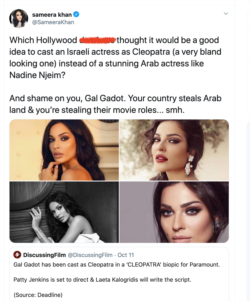On Oct. 11, the Hollywood insider publication Deadline broke the news that Paramount Pictures won an auction for an epic movie about the life of the ancient Egyptian queen Cleopatra.
Laeta Kalogridiis, an American screenwriter of Greek descent, will produce a screenplay for the movie, and Israeli actress Gal Gadot (star of “Wonder Woman”), who authored the idea of a movie about Cleopatra and is co-sponsoring the project, will play the lead role, Deadline reported.
The announcement lit social media on fire. On Twitter alone, thousands responded that the historical Cleopatra was a woman of color and an Arab and should not be played by a white actress. Many called for Gadot to be “canceled” (publicly shamed and isolated).
Sameera Khan, the former Washington, D.C., reporter for RT (Russia Today), the Russia’s state-owned international television channel, was among the first to shame Gadot.
“Which Hollywood [expletive] thought it would be a good idea to cast an Israeli actress as Cleopatra (a very bland looking one) instead of a stunning Arab actress like Nadine Njeim? And shame on you, Gal Gadot. Your country steals Arab land & you’re stealing their movie roles...” Khan tweeted to her 65.5K followers.
Khan’s tweet trended and racked up more than 4,400 retweets, likes and comments.
There has long been debate over Cleopatra’s race, ethnicity and precise family lineage. But the claim that Cleopatra was an Arab is generally considered false.
According to historians and biographers, Cleopatra, the last queen of Egypt, was a Macedonian Greek. Greeks ruled Egypt after Alexander the Great conquered it in 332 B.C.
Cleopatra’s origins have been described in several scholarly biographies, including “Cleopatra. Beyond the Myth,” written by the French Egyptologist Michel Chauveau, and “Cleopatra: Last Queen of Egypt,” written by British Egyptologist Joyce Tyldesley.
“For ten generations her family had styled themselves pharaohs. The Ptolemies were in fact Macedonian Greek, which makes Cleopatra approximately as Egyptian as Elizabeth Taylor,” Pulitzer Prize-winning author Stacy Schiff wrote in her 2010 biography, “Cleopatra: A Life.”
Elizabeth Taylor, the iconic American-English actress, played Cleopatra in a 1963 movie that was perhaps the most famous of many portrayals on film.
Schiff’s account of Cleopatra’s origins and life has been praised for historical accuracy and meticulous research using anthropological and archeological sources.
In an essay headlined “10 Little-Known Facts About Cleopatra,” the History Channel author Evan Andrews describes the last queen of Egypt, as “not ethnically Egyptian,” but a descendant of the Ptolemaic dynasty of Macedonian Greek rulers, “the first member of her line to learn the Egyptian language.”
After many critical responses to her Twitter post, Sameera Khan attempted to correct it in a follow-up tweet claiming to “know for sure” that Cleopatra was “part Greek and part Berber.”
That is also wrong, according to Andrews, who wrote that Cleopatra was “the product of incest.”
“Like many royal houses, members of the Ptolemaic dynasty married within the family to preserve the purity of their bloodline,” Andrews wrote.
Ancient Greek texts preserved in Egyptian archives played a key role in the scholarly restoration of “real Cleopatra” vs. her “mythical” depiction in popular culture. Cleopatra emerges in those texts as “a scholar and a teacher, knowledgeable in medicine, magic and alchemy, participating in scholarly exchanges with other philosophers.”
Neither Gal Gadot nor Laeta Kalogridis responded to critics on social media.
“Incredibly excited to get the chance to tell the story of Cleopatra, my favorite Ptolemaic Pharaoh and arguably the most famous Macedonian Greek woman in history. Never thought I’d have the opportunity to tell a story like this, with women who have inspired me beyond words,” Kalagoris tweeted.
Gadot promised to tell Cleopatra’s story “for the first time through women’s eyes.”
Sameera Khan is considered a social media influencer. An American of Pakistani descent, she came to public attention after winning a Miss New Jersey contest and went on to host an RT television program broadcast from the channel’s Washington bureau.
The Cleopatra tweet wasn’t her first controversial one. In 2018, Khan tweeted two memes praising the Soviet dictator Joseph Stalin and the Gulag – Stalin’s notorious system of concentration camps, in which millions of Soviet citizens were imprisoned and perished.
She later tweeted a correction and apology.






